COP101: What is a COP?
Very simply: what is a COP, who attends and why is this one important?
By John Lang
Share
Last updated:
Every year, the world comes together to negotiate a coordinated response to climate change. Here, we present a few simple bullet points (and some graphics) on the jargon-laden process that is the UN climate summits so you can better understand what it is and why it's important.
- Who runs it? The United Nations Framework Convention on Climate Change (UNFCCC) is the part of the United Nations that leads on climate change. The name stems from a treaty of the same name signed by 154 states at the Rio Earth Summit in 1992. It came into force in 1994.
- Who do they represent? The UNFCCC is backed by 197 ‘Parties’ — who are the 193 countries that make up the United Nations, the EU and three countries that are not official UN members (the Cook Islands, the Holy See and Palestine). These Parties meet once a year at a ‘Conference of the Parties’ or COP for short. The COP is effectively the UNFCCC decision-making body that negotiates on how to best tackle climate change.
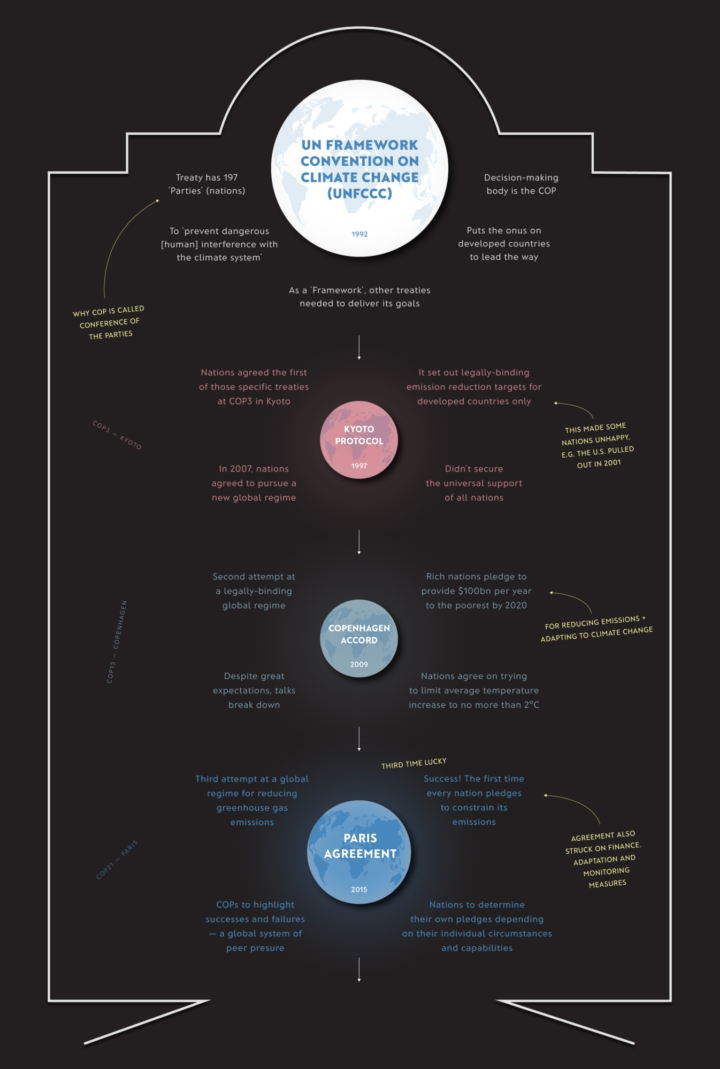
- What have they achieved? Two global treaties have been agreed and brought into force since 1994. The Kyoto Protocol, agreed in 1997, and ran from 2005 to 2020. It was the first global agreement aiming to reduce greenhouse gas emissions, but it was limited, not least as some nations were not behind it. (The US, for example, did not ratify it in domestic law.) The Paris Agreement, agreed in 2015 and currently in force, contains provisions intended to bind the world to keep global average temperature increase to well below 2°C compared with pre-industrial times, aiming for 1.5°C - which is the critical level for averting the worst climate change impacts on nations, people and species most vulnerable.
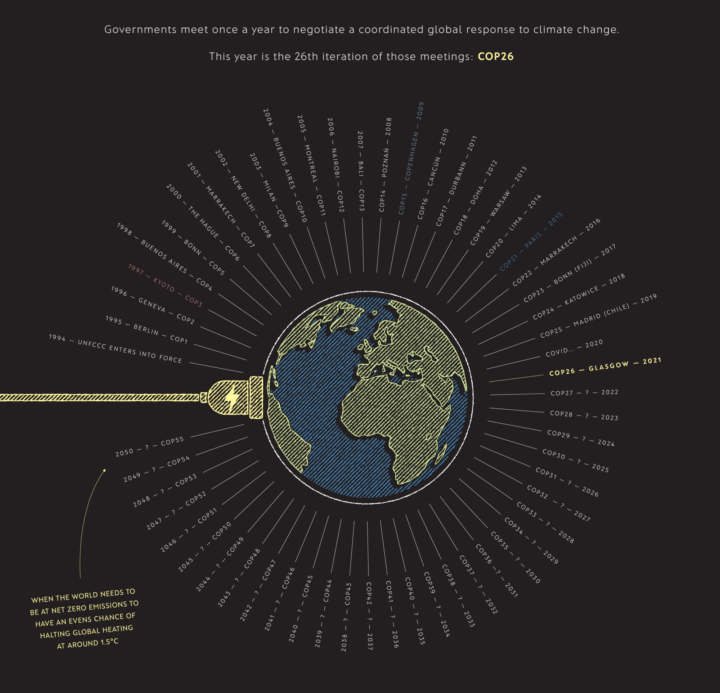
- What is on the agenda? Since the Paris Agreement was agreed at COP21 in Paris in 2015, COPs have mainly been about forging agreement on the details of implementation and ramping up nations' ambition on climate action. Very broadly, the issues are:
Mitigation: that is, cutting emissions to limit future warming. This is done via nations' nationally determined commitments (NDCs) and long-term strategies (LTSs), which pledge to cut carbon emissions by a specific amount within an agreed time-period. For the current round of NDCs, that deadline is 'by 2030'. Collectively, ambition in these should add up to putting the world on a path to net zero emissions globally by mid-century (via those LTSs). Net zero means cutting all possible greenhouse gas emissions, and then ensuring that the remaining emissions are removed by natural systems (e.g. trees, or peat) or technologies (e.g. direct air carbon capture and storage) that absorb carbon. The deadline for net zero is sooner for rich nations than it is for developing nations.
Adaptation: nations are also committed to acting to adapt to the impacts of climate change - that is, making changes to infrastructure, and to the way people live and work to cope with climate impacts, such as sea-level rise, droughts etc. This is a particular focus for developing countries and those most vulnerable to climate impacts.
Finance: rich nations provide financial support to poorer and middle-income countries to afford climate mitigation, adaptation, and loss and damage incurred as a result of those climate impacts.
The Paris rulebook: the process whereby nations agree on the rules over how delivery against the Paris Agreement will be measured and judged. This includes issues such as common timeframes for national emission pledges (the NDCs), standards for measuring and reporting emissions, and rules for trading emission cuts between nations and even private companies.
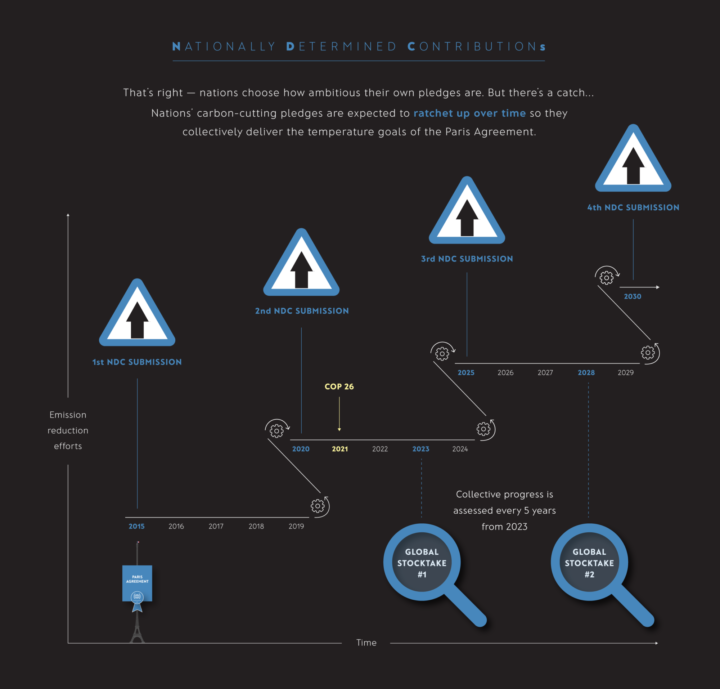
- When & where? COPs usually take place in November/December each year. The first took place in Germany in 1995, but hosting rotates between the five UN regions. COP25 was hosted by Chile, for the Latin America and Caribbean Group (although unrest just before meant that the event actually took place in Madrid, Spain). Next year's meeting, COP27, will be hosted by a member of the Africa Group. These annual meetings are supported by ‘intersessional’ meetings in May/June in Bonn, where parties discuss more granular details in preparation for the higher-level negotiations (and hopefully agreements) at the COP.

- What has this to do with the UK? COP26 will take place in Glasgow, between 1-14 November, 2021. It was due to take place in 2020, but the pandemic resulted in a delay. The COP host appoints a President to chair and oversee the COP; the UK appointed former Business Secretary Alok Sharma. His job is to act on behalf of the parties and the UN, working in advance and at the COP itself to ensure that the meeting achieves what is required and, crucially, progresses the goals of the Paris Agreement.
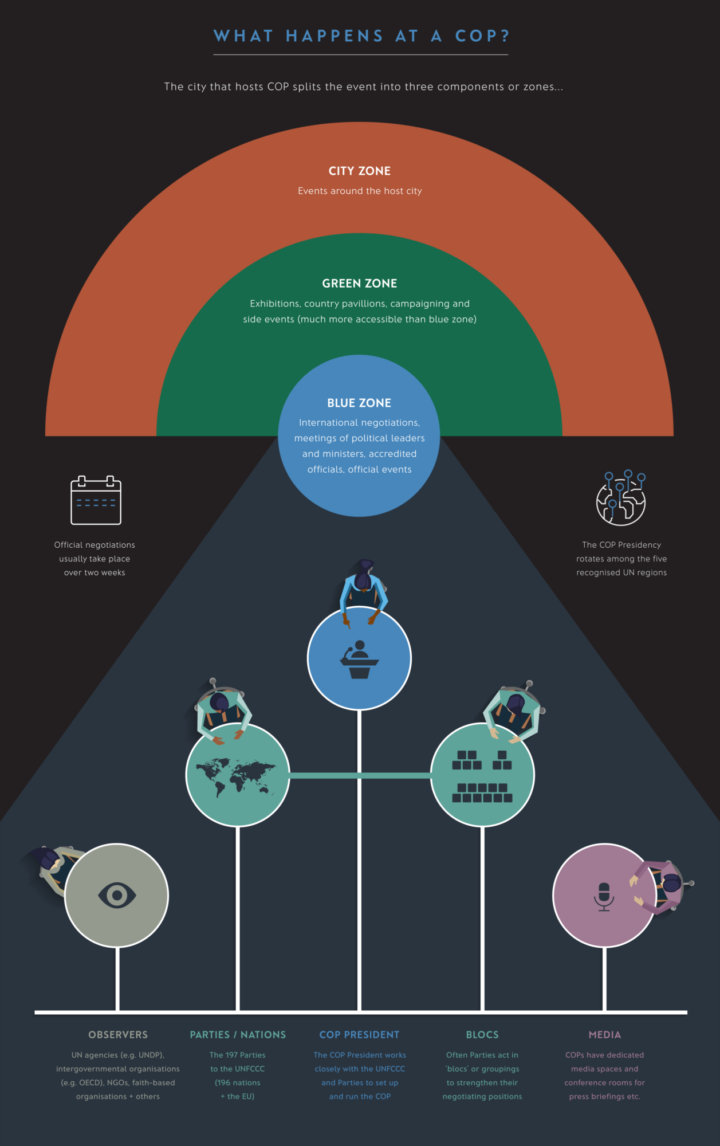
- What happens first? Parties to the Paris Agreement are required, under its terms, to submit enhanced pledges (NDCs and LTSs) before COP26; by the time leaders arrive in Glasgow, the action implied in those pledges should be enough to keep warming much closer to the Paris temperature goals than now. Until recently, pledges added up to roughly 3°C of warming by 2100; the Glasgow COP will aim to keep the much safer target of 1.5°C by 2050 within reach.
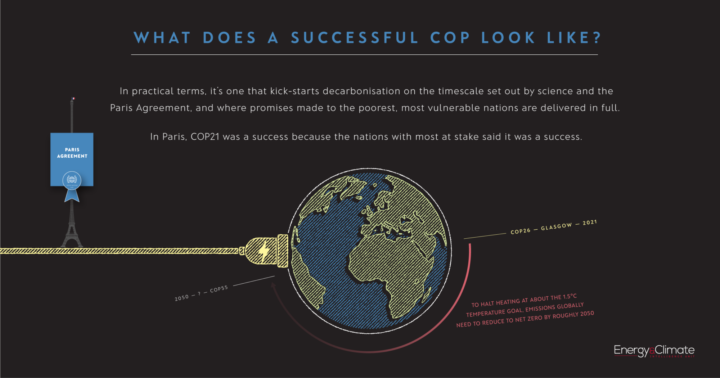
- How much money is needed? In 2009, rich countries pledged $100bn per year in financial support to poorer countries, by 2020. That threshold has not yet been achieved. At COP26, rich countries are expected to raise their contributions to meet that original pledge, and begin the process of negotiating a higher annual amount in the future. Delivery of this will be critical to trust in the process, given that the promise was made, as well as to enable poorer nations to cut emissions and adapt to climate impacts. What is more, these billions help to generate the needed trillions of dollars of private finance to tackle climate change.
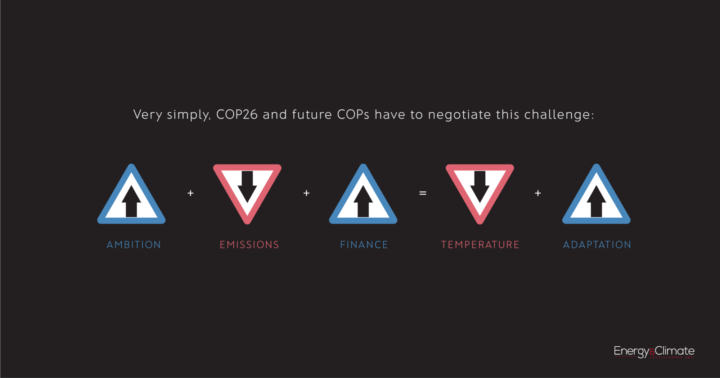
- What are the outcomes expected at COP26? Radically raised ambition, delivery on finance and agreement on the ‘Paris rulebook’ are the outcomes most needed in Glasgow. Agreements are likely to be reached between smaller groups of nations and 'non-state actors' (e.g. cities, states, and companies) around the edges of the conference too. One such, agreed at COP24, was on phasing out coal for electricity generation via the Powering Past Coal Alliance. More of these agreements will be welcomed as outputs from Glasgow – for example, to end deforestation globally or an alliance of nations willing to ramp up investments in nature-based solutions (those natural systems that absorb carbon). Alok Sharma summarises these desired outcomes in a speech given to mark the six-month point until the summit takes place.
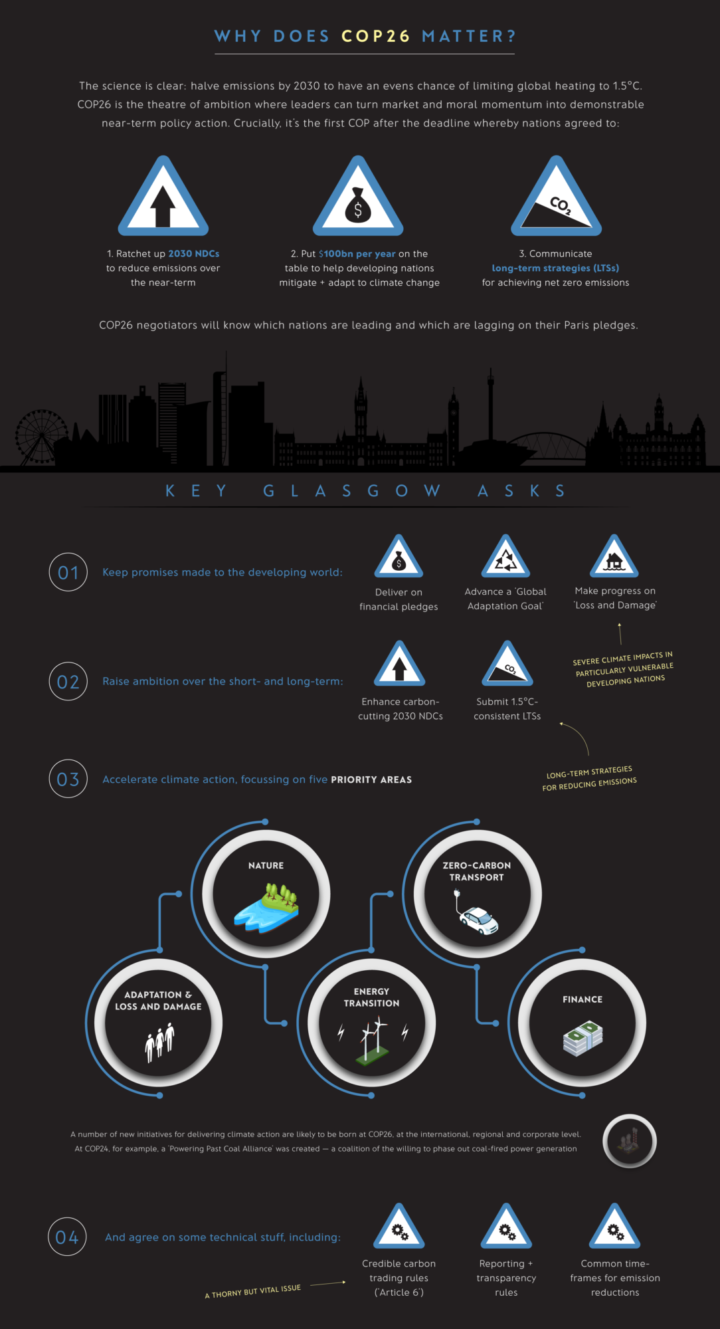
For an even simpler explanation of what a COP is, take a look at our infographic: COP26: A visual guide
Share